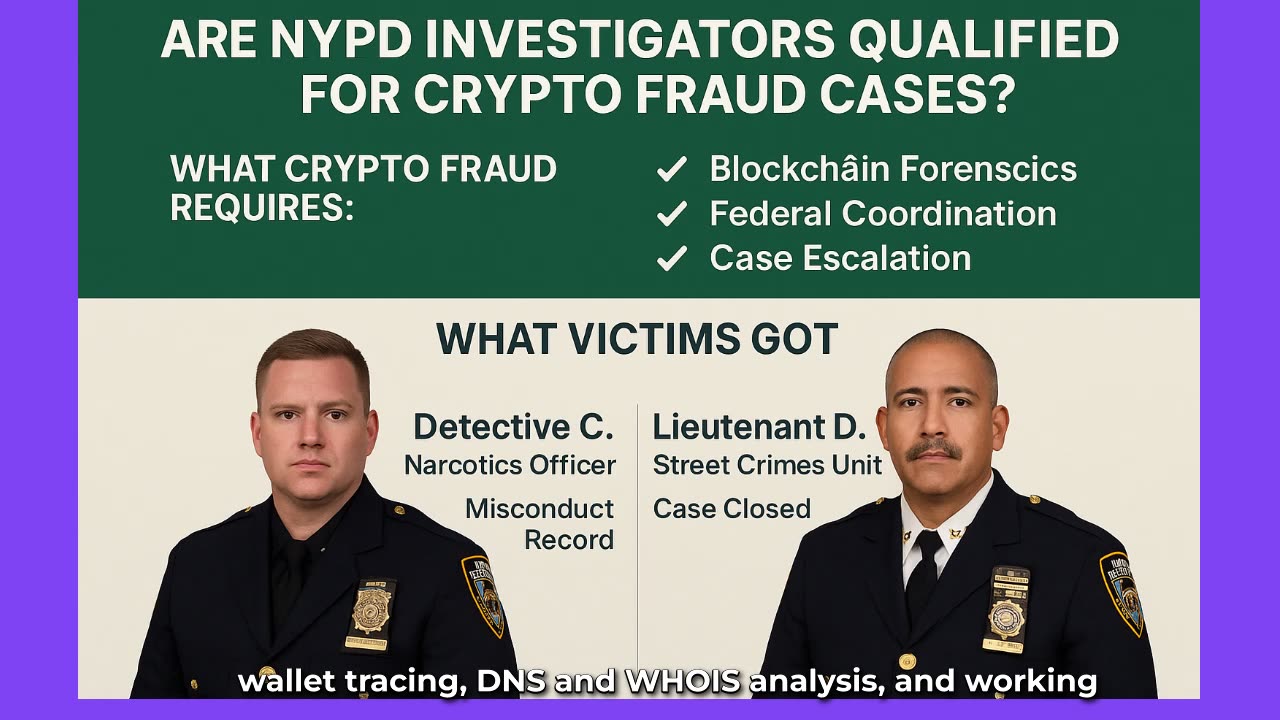Premium Only Content

Part 46: Are NYPD Investigators Qualified for Crypto Fraud Cases?
In this episode, we take a hard look at the officers assigned to my case — Detective C. and Lieutenant D.
Both are career NYPD officers, but their résumés reveal very little exposure to cybercrime or crypto tracing. Instead, their records reflect years in narcotics, transit, and precinct patrol work.
Detective C. rose to Detective Grade 3 in the Grand Larceny Division in late 2024, but his history includes substantiated CCRB misconduct — abuse of authority, discourtesy, and failure to follow protocol — along with two civil rights lawsuit settlements. His background is in narcotics and transit enforcement, not blockchain forensics.
Lieutenant D. has a long service history across multiple precincts, with over a dozen misconduct complaints and six federal lawsuits settled by the City. Like Detective C., her career path reflects traditional policing — narcotics, street crime, and precinct detective squads — not financial cybercrime expertise.
💡 The core issue:
Crypto fraud investigations demand specialized training in blockchain analysis, tracing wallets, reading WHOIS records, and coordinating with federal cybercrime units. Instead, the NYPD assigned officers with disciplinary baggage and no proven crypto qualifications — and then used their conclusions to prematurely close my case.
This isn’t just about me. It’s a systemic failure: when victims of complex digital fraud are left to investigators who lack the tools or training, justice is denied before it even begins.
⚠️ Disclaimer: This presentation is based on publicly available misconduct records, lawsuit filings, and agency disclosures. It is for educational and public-interest purposes only and does not make personal accusations beyond those documented sources.
-
 LIVE
LIVE
BlackDiamondGunsandGear
3 hours agoAfter Hours Armory / RIP Charlie Kirk / What we know
224 watching -
 29:09
29:09
Afshin Rattansi's Going Underground
1 day agoThe Political Life of Malcolm X: Busting the Myths (Prof. Kehinde Andrews)
27.4K13 -
 LIVE
LIVE
DLDAfterDark
4 hours ago $1.35 earnedThe Assassination of Charlie Kirk - Just What We KNOW
294 watching -
 1:33:56
1:33:56
MattMorseTV
5 hours ago $31.76 earned🔴Exposing his PARTNER IN CRIME.🔴
67.2K227 -
 1:26:51
1:26:51
vivafrei
9 hours agoCharlie Kirk Assassination - When Peaceful Discussion Becomes Impossible - With Jose Vege
91.2K206 -
 2:04:12
2:04:12
Mally_Mouse
1 day ago🌶️ 🥵Spicy BITE Saturday!! 🥵🌶️- Let's Play: Supermarket Together
44.2K3 -
 1:15:37
1:15:37
BooniesHQ
9 hours ago $6.95 earnedGame Of SKATE Donny Hixson Vs. Chris Massie: Boonies Skate Night 2
64K7 -
 2:56:25
2:56:25
Barry Cunningham
10 hours agoTHE TAKING OF CHARLIE KIRK HAS IGNITED A FLAME! AND A BREAKING (BUT NOT SHOCKING) UPDATE!
114K116 -
 9:38
9:38
Exploring With Nug
13 hours ago $3.18 earnedSearching Florida Waters for a Missing Murder Victim’s Car | Alligator Encounter!
43.7K1 -
 2:05:59
2:05:59
SavageJayGatsby
1 day agoSpicy Bite Saturday | Let's Play: Supermarket Together
38.2K